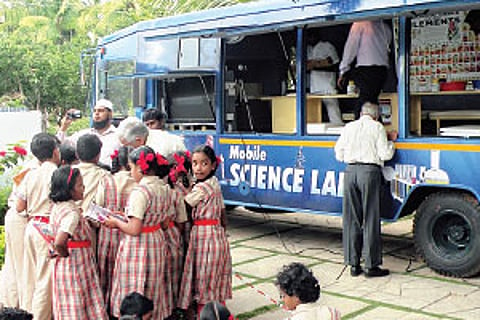

“How much time does it take to reach the moon if we are travelling by car? What happens if the level of oxygen increases from 21 per cent of air to 60 per cent? Why do we use the speed of light to measure the distance in universe?”
The questions which have many adults flummoxed are now the topic of discussion among students of seventh to tenth standard in schools across the city. The Mobile Science Lab (MSL) has toured eight government and aided schools in Hyderabad and ranga Reddy districts and 200 schools across eight states in the country setting young minds on the path of scientific thinking.
The lab was established in September 2011 by MA Lateef Atear and is funded by Indian Muslim Relief and Charities(IMRC) and supported by Muslim Educational Social and Cultural Organisation (MESCO), the MSL is a lab on wheels carrying equipment required to conduct physics, chemistry and biology experiments. Subject professionals proficient in the subjects accompany the lab and to impart scientific education in an interactive manner to school-going children. “I used to attend all science fairs including those conducted at schools as I have always curious by nature about the experiments demonstrated. I observed that practical teaching of sciences is lacking or completely absent in many schools. This prompted me to survey thousands of schools to find out how science is taught,” says Lateef Atear. He concluded that only 600 of the 7000-odd schools in Hyderabad have labs and the remaining are not interested in setting up a lab as it requires additional space and funds. “After much deliberation, I thought of establishing a mobile science lab which for teaching science to children,” he explains.
The enterprising assistant manager of Columbus Ship Management Pvt converted a 40-seater school bus to set up the mobile lab. He added a chassis and modified it according to requirement. Lateef was helped in the project by Rathan Toorkey, professor of chemistry at Dr. Reddy’s Labs and Sai Prakash, principal of LV Prasad School of Optometry. The duo design the curriculum and also tour with the bus. They have also trained three subject professionals to take up the tour by turn.
How children react to the hands-on knowledge delights Lateef. “We taught them how to light up small bulbs using wind energy. We used two compact disks, used water bottles, a cycle spoke, two magnets and copper coils to demonstrate it. After the demonstration they asked us if a 100 watt bulb can be powered using this technology and what it takes to do so,” says Lateef who adds that this sort of enthusiasm from the students keep him going. “The curiosity of a child asking questions is the start of scientific thinking process.”
The lab has adopted eight schools in the city where they teach science once in two months. On the whole, the lab has benefitted 21,000 students till date. The lab can be invited by a school to demonstrate five experiments per day. They charge between `4000 to `7000, depending on school’s fee structure.
They also map the project’s effect on students by using indicators such as stress levels associated with learning science and curiosity levels. “We found that stress levels have come down and students are asking more questions,” observes Lateef.
He calls his project a social venture as it creates a positive impact on society. The project was awarded the first prize at the iDiya social venture competition conducted by the Indian School of Business and won the popular choice award at Indian Institute of Management Bangalore’s Next Big Idea. However, the schools seem reluctant to take up the initiative for better understanding of the subject. “Though it has been more than a year and half, schools have not shown as much interest as we expected. I am very confident that schools will recognise our efforts to initiate a thought process among children.”
Lateef plans to set up a science academy in the future where college and Ph.D students can use the lab to conduct their experiments for a fee.